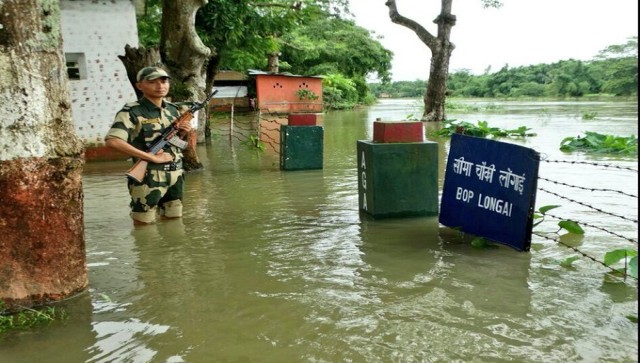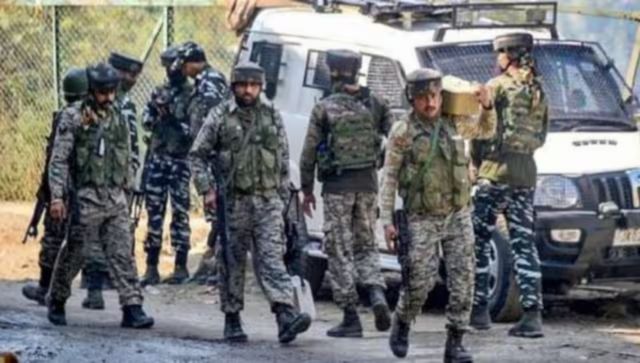New Delhi: The Union Cabinet chaired by Prime Minister Narendra Modi in one stroke virtually ceased the IPS officer’s fiefdom in the paramilitary forces, paving way for cadres of different paramilitary forces to be promoted to important positions, which were till now restricted only to IPS officers.
The decision on Wednesday to approve Organised Group ‘A’ Service (OGAS) to the Cadre Officers of Central Armed Police Forces (CAPFs), which is an outcome of a trying legal battle of over seven years, will have direct impact on promotion of Group ‘A’ cadre officers to the important positions of paramilitary forces, which till now were controlled by the IPS officers on central deputation.
Before getting into the history of pitched legal battle, let’s examine how this decision will impact approximately 12,000 cadre officers in paramilitary forces and IPS officers occupying key posts in these organisations. Firstly, with this decision, there is a possibility that in the next couple of years, one of these forces head, also called as Director General (DG) could be from the cadre — directly recruited in the CRPF, BSF, ITBP, SSB and CISF through UPSC. As a serving IPS officer on the condition of anonymity said there was clear discrimination against cadre officers of these forces recruited at the level of Assistant Commandant and all the top positions are occupied by the IPS officers.
“Nowhere the service rules or constitution says that DG of CRPF or BSF has to be IPS officers. Even the majority of the IPS officers who come on deputation in paramilitary forces at Inspector General (IG) rank occupies fancy and lucrative positions like IG (Personnel), IG (Administration) or IG (Procurement). Very few officers on deputation are deployed in hard areas or in operations and very less number of them do all three hard areas — Naxal, North East and Jammu & Kashmir.
“Moreover, these forces have enough strength of officers on their own, but still if you want deputation, then the willing IPS officers must prove the combat calibre. By virtue of being an IPS officer, they wield considerable power over cadre officers, which is not good for the force deployed for counter-insurgency. CAPFs never invokes criteria of combat experience for IPS officers seeking deputation in paramilitary forces, which is again not a good sign. The Cabinet decision for cadres will bring a better degree of cohesion in these forces,” the IPS officer said.
Will this Cabinet decision completely close the door on IPS officers seeking central deputation in paramilitary forces? Not immediately. The government cannot just throw out 150-200 odd IPS officers currently on deputation in CAPFs. But, in the next 5-7 years, the number of IPS officers occupying important positions in five CAPFs will definitely go down drastically.
Another significant impact will be visible rush for deputation in other Central agencies like Central Bureau of Investigation, Enforcement Directorate, Intelligence Bureau, Research & Analysis Wing and less lucrative positions in Narcotics Control Bureau, National Human Rights Commission (NHRC), Wildlife Control Bureau, National Crime Record Bureau and Bureau of Police Research & Development. Besides, there are positions of vigilance officers in Public Sector Enterprises (PSEs) and other ex-cadre positions created by the state governments.
But, many of these positions are merely parking, with some even considered as a punishment posting and doesn’t have the grandeur of a plum posting in the paramilitary forces. There may not be too much rush in the CBI because it requires prior experience of investigation and both domestic and external spy organisation, may not be too interested about officers coming on a few years of deputation.
A serving IPS officer said there are two options for hundreds of IPS officers out of 3,972 total strength looking for deputation, more ex-cadre posts can be created by the states and secondly the government could get able IPS officers in other Central government departments but the latter could trigger a confrontation with the IAS officers. He further said, immediately after the Cabinet decision, murmurs in the corridors of power suggested a third option, which was to retain the IPS officers in CAPFs and give CAPFs cadre officers other positions in the central department with the benefit of Non-Functional Financial Upgradation (NFFU).
“The idea is that paramilitary cadre officers after this decision can be treated as other 30-31 other organised Group ‘A’ officers and posted in different departments. But, how far this will work is questionable because these paramilitary officers are trained for combat and not to make powerpoint presentations. However, another argument is that deputation to other departments will make them better skilled for top jobs in paramilitary forces. But in any situation, the dominance of IPS lobby in paramilitary forces will now be weakened for sure and rightly so because cadre officers have been stagnated for a very long time with little assured and timely promotions,” the IPS officer said.
Discontent within paramilitary forces officers
VPS Panwar, who joined the CRPF as Assistant Commandant and retired as IG said 50 percent of top key positions in the paramilitary forces are occupied by the IPS officers leaving little room for promotion of cadre officers. Panwar fought the legal battle in the court since 2012 along with other retired officers for the better promotional prospect of paramilitary cadre.
“After Supreme Court upheld the 2015 judgment of Delhi High Court, we were expecting this decision. I know IPS lobby tried to spike it but the government provided us huge relief. You will be surprised to know that many cadre officers as DIG in the paramilitary forces are much senior to IPS IG on deputation. Even I was senior to my IG but we hardly had promotional avenues. These IPS officers only come as IG on deputation, why not as Deputy Commandant if they have a love for paramilitary forces and capability of combat operations. They have a choice posting but we don’t have it. In my service of 38 years, I have seen 30 DG come and go and also seen hundreds of cadre officers retiring just at the position of DIG. If the IPS is responsible for law and order duty in the state, they should focus on that instead of looking for a plum posting in the paramilitary forces,” Panwar said.
He argued that the whole purpose of deputation is to temporarily import officers from an outside organisation in the absence of sufficient eligible officers within a particular organization but in the case of CAPFs there was a need for realistic assessment since these forces are neither short of experience nor short of sufficient eligible officers. He also said fixing of deputation quota in organisations like CAPFs could be dubious because the cadre officers may suffer stagnations at various levels and other departments and states may ease out stagnations since officers are going on deputation.
His arguments, due to cases of stagnation of cadre officers for the last 50 years, appears coloured but he claimed that IPS officers association tried till last minute to scuttle this decision because, in the long run, it will reduce their influence in the paramilitary forces. It was argued in the Delhi High Court in 2015 that less than 1.5 percent posts are earmarked for IPS officers coming on deputations and rest 98.5 percent posts are filled by promotion only. The cadre officers, however, argued that most of the higher posts including DGs, Special DGs, Additional DGs and most of the decision-making posts are held by those on deputation in the paramilitary forces who are highly inexperienced to the affairs of the CAPFs and on many occasion the senior officers including DG’s are posted to CAPFs with no earlier experience of these forces, thus creating a wide functional and operational gap between officers and men.
The government had countered the bunch of petitions filed by the retired cadre officers in the high court and had even claimed that that CAPFs does not fulfil all the attributes of the ‘Organised Group ‘A’ Services. It was also argued on behalf of the government that NFFU cannot be extended to them on the ground that the 6th Pay Commission was not in favour of the creation of newly organised services which become a closed cadre where outsiders cannot join even they are more qualified. The high court, however, said that the Pay Commission is not authorised to define ‘Organized Services’ or to grant such status to any service since it has no independent source of information and whatever information is submitted to it by the various departments sent through various memorandums form the basis of its report.
Court also the government has through its own process classified the BSF, CRPF, ITBP and CISF as being at par with each other in 1986, 1993 and 2010 respectively and the monographs wherein the aforesaid CAPFs have been shown as part of the same Group ‘A’ Central Civil Services. The high court judgment clearly stated that government own records and documents acknowledge the CAPFs as Organised Group ‘A’ Service.
“The issue of acknowledging the petitioners as OGAS has been pending for some time like a festering wound. From the preceding discussion, the Court would note although from the government records it can clearly be seen that the petitioners have over and over again been recognized as OGAS, an element of obfuscation has been kept alive. It cannot be overemphasised that in matters relating to the armed forces and the paramilitary/CAPFs there ought to be clarity and certainty apropos the service benefits which the forces would be entitled to,” Delhi High Court September 2015 judgment had said.
Panwar said one cadre was enjoying at the expense of the other, which he hopes will now stop. He cited a case of 2IC (second-in-command) claiming that for a decade the person was stagnated at one level because of lack of promotional opportunities. Although Panwar questions the intellectual contribution of IPS officers to the paramilitary forces, the IPS officers, who spoke to Firstpost for this story are waiting for the government notification to figure out how deputations and posts will be finally fixed in the future.


)




)
)
)
)
)
)
)
)